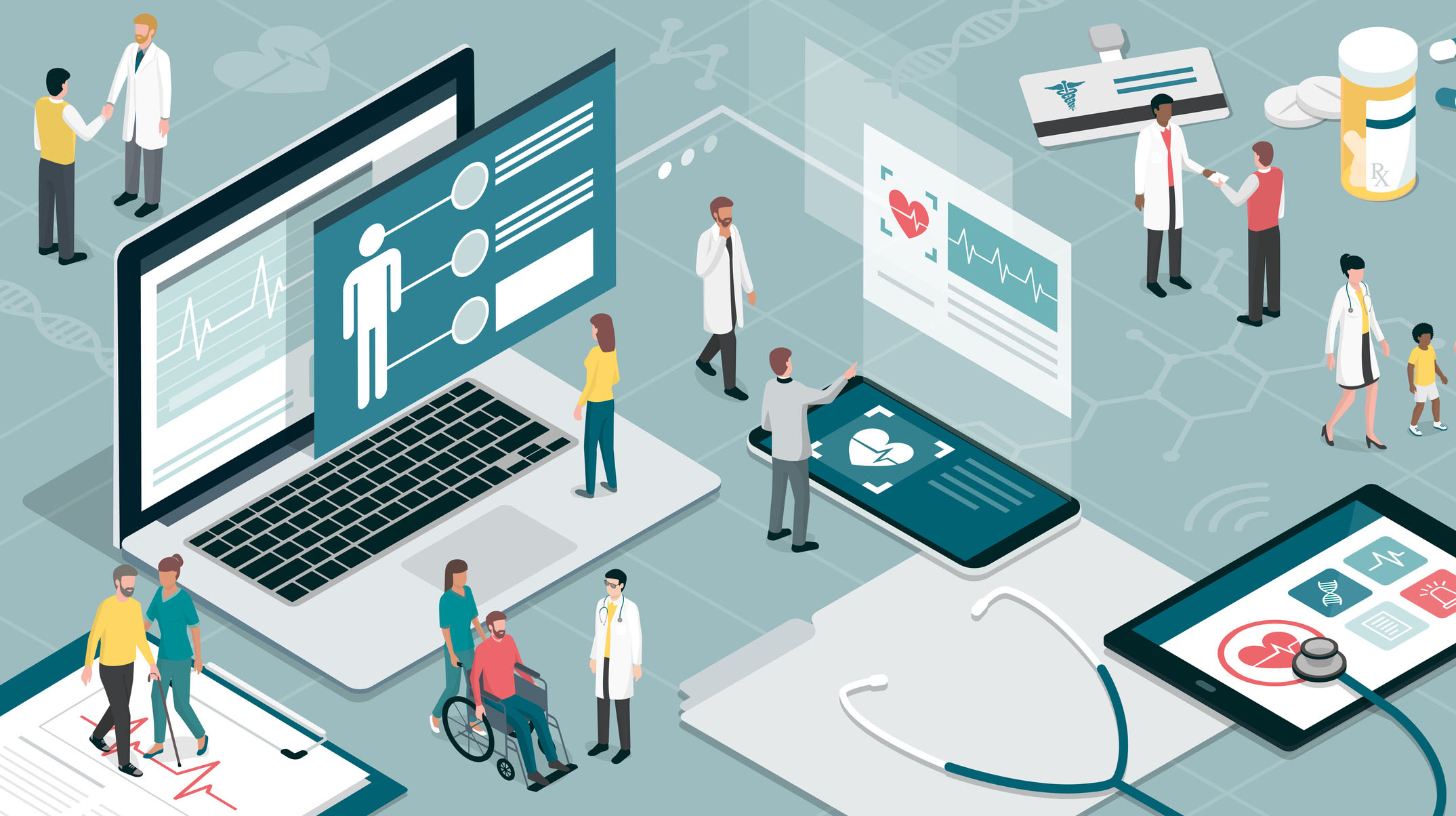Health data is becoming more readily available in an internet-based world. With secure portals and mobile phone apps, most people prefer to access their health records from the comfort of their homes. This may leave you wondering, “Is my healthcare information really safe?”
Luckily, health information managers are working hard every day to guard and use data responsibly, ensuring every patient’s privacy and the integrity of their records.
Working in Health Information Management
This past year, we have seen a dramatic shift towards more complex and secure electronic health records, spurred by both market demand and government regulation. As we continue to see advancements in health database management, data privacy and security, and information exchange technology — such as APIs and blockchain, the demand for experienced health information managers will only get greater.
Whether you are earning a bachelor’s in health information management, or a master of science in health information management, a career in this field can lead you to a variety of different positions, but they all come back to one thing — keeping information secure.
With career paths in information governance, informatics, data analytics, and revenue cycle, it is easy to tell that health information managers play a vital role in healthcare. Common health information manager’s responsibilities may include developing, implementing, and managing individual aggregate and public health care data collection and reporting systems. Sounds important, doesn’t it? That’s because it is. The practice of acquiring, analyzing, and protecting medical information is a vital step in being able to provide safe quality care to every patient.
Staying relevant
Technology is ever-changing, and that means health information managers need to continuously stay relevant and knowledgeable on policies and digital capabilities. Health information managers continuously participate in trainings, including those concerning Health Insurance Portability and Accountability Act (HIPAA).
From the moment a medical event occurs, data is being captured and the accuracy and privacy of that data ensure every individual can receive the best possible care. Health information managers play a critical role in making sure that data is processed and passed along to health professionals as quickly as possible.
One example of this would be how a patient’s coding (their diagnosis and treatment details) is recorded. Medical coding affects the patient’s billing, quality reporting, referral process, and so much more. A lapse in accuracy and securing when it comes to medical coding could cause a wide array of issues. With coding segments and processes constantly evolving, health information managers need to stay relevant with coding practices — a critical step in ensuring the quality and safety of all patient experiences.
Phighting the Phish
What exactly is phishing? Phishing is when an attacker sends a fake message to obtain confidential information from an individual, often deploying malicious software onto the victim’s system. Phishing is only one possible data security concern. Thankfully, health information managers can worry about the array of potential threats. To do your part in ensuring all your data is secure against phishing and other potential breaches, follow these six tips provided by a health information manager.
- Review any software security tutorials and follow their recommendations: All computers and software come with installed security tutorials and embedded information that can be read. However, it’s not uncommon for users to skip over these resources.
- Avoid leaving your devices on when not in use: When a device is on and connected to a network, it is more susceptible to being in danger of being hacked.
- Utilize your built-in security features: This may include mute buttons, camera shutters, password protect files, lock screens and so much more.
- Keep your software up to date: Software regularly needs updating. Often, updates include security features that are blind to the user but are protective against the latest criminal techniques.
- Avoid using the same password for your logins: If a user utilizes the same password for multiple access points and a hacker identifies that password, multiple sets of data could be in jeopardy —not just one.
- Regularly clear your web browser’s history: This helps to assure previously used passwords are not saved in a browser.
To learn more about earning a degree in Health Information Management at Davenport, please visit these links:
Bachelor’s in Health Information Management
Master of Science in Health Informatics and Information Management
Share This Story!
Health data is becoming more readily available in an internet-based world. With secure portals and mobile phone apps, most people prefer to access their health records from the comfort of their homes. This may leave you wondering, “Is my healthcare information really safe?”
Luckily, health information managers are working hard every day to guard and use data responsibly, ensuring every patient’s privacy and the integrity of their records.
Working in Health Information Management
This past year, we have seen a dramatic shift towards more complex and secure electronic health records, spurred by both market demand and government regulation. As we continue to see advancements in health database management, data privacy and security, and information exchange technology — such as APIs and blockchain, the demand for experienced health information managers will only get greater.
Whether you are earning a bachelor’s in health information management, or a master of science in health information management, a career in this field can lead you to a variety of different positions, but they all come back to one thing — keeping information secure.
With career paths in information governance, informatics, data analytics, and revenue cycle, it is easy to tell that health information managers play a vital role in healthcare. Common health information manager’s responsibilities may include developing, implementing, and managing individual aggregate and public health care data collection and reporting systems. Sounds important, doesn’t it? That’s because it is. The practice of acquiring, analyzing, and protecting medical information is a vital step in being able to provide safe quality care to every patient.
Staying relevant
Technology is ever-changing, and that means health information managers need to continuously stay relevant and knowledgeable on policies and digital capabilities. Health information managers continuously participate in trainings, including those concerning Health Insurance Portability and Accountability Act (HIPAA).
From the moment a medical event occurs, data is being captured and the accuracy and privacy of that data ensure every individual can receive the best possible care. Health information managers play a critical role in making sure that data is processed and passed along to health professionals as quickly as possible.
One example of this would be how a patient’s coding (their diagnosis and treatment details) is recorded. Medical coding affects the patient’s billing, quality reporting, referral process, and so much more. A lapse in accuracy and securing when it comes to medical coding could cause a wide array of issues. With coding segments and processes constantly evolving, health information managers need to stay relevant with coding practices — a critical step in ensuring the quality and safety of all patient experiences.
Phighting the Phish
What exactly is phishing? Phishing is when an attacker sends a fake message to obtain confidential information from an individual, often deploying malicious software onto the victim’s system. Phishing is only one possible data security concern. Thankfully, health information managers can worry about the array of potential threats. To do your part in ensuring all your data is secure against phishing and other potential breaches, follow these six tips provided by a health information manager.
- Review any software security tutorials and follow their recommendations: All computers and software come with installed security tutorials and embedded information that can be read. However, it’s not uncommon for users to skip over these resources.
- Avoid leaving your devices on when not in use: When a device is on and connected to a network, it is more susceptible to being in danger of being hacked.
- Utilize your built-in security features: This may include mute buttons, camera shutters, password protect files, lock screens and so much more.
- Keep your software up to date: Software regularly needs updating. Often, updates include security features that are blind to the user but are protective against the latest criminal techniques.
- Avoid using the same password for your logins: If a user utilizes the same password for multiple access points and a hacker identifies that password, multiple sets of data could be in jeopardy —not just one.
- Regularly clear your web browser’s history: This helps to assure previously used passwords are not saved in a browser.
To learn more about earning a degree in Health Information Management at Davenport, please visit these links:
Bachelor’s in Health Information Management
Master of Science in Health Informatics and Information Management
Share This Story!
Stay connected!
Get the latest Davenpost News delivered to your inbox!
Related Stories
Sophomore Noah French sat outside a run-down apartment complex in Detroit waiting to deliver food to one of its residents [...]
Image Caption: Those pictured in the attached photo are, from left to right, Misty Davis – Department Chair for Legal [...]
On Sunday, more than 1,300 graduates were honored at Davenport University’s 158th commencement ceremony at Van Andel Arena in Grand [...]
Latest Stories
Members of the West Michigan community gathered at Grand Rapids’ Wealthy Theatre on Feb. 4 to honor Rev. Dr. Martin [...]
The familiar pop-pop of ping-pong balls filled the CLE at Davenport University’s W.A. Lettinga Grand Rapids Campus as students, staff [...]
Photo caption: Laura Oblinger and the late Donald W. Maine Davenport University’s Direct Connect partner, Northwestern Michigan College, is celebrating [...]








